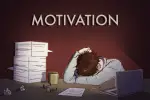Transitions mean something different to everybody, but most of the time, they’re not easy. At the moment, I and millions of others are knee-deep in the new, independent life that comes with transitioning to college. Whether it’s the workload, sticking to a schedule or developing independence, the college transition is difficult for everybody. The inevitability and universality of stress means that everyone needs tools to relax. Here are a few rather strange activities I have adopted into my self-care repertoire.
1. Origami
This is the most unusual of the bunch. Although it requires some skill, the simplicity in the art is what makes it so relaxing. I sit down with a piece of paper, an Origami YouTube tutorial and complete ignorance of everything around me. It’s a time to solely focus on my hands and making crisp creases. The paper is delicate; it bends and folds at my will. It makes me feel completely in control.
The YouTube tutorials themselves are also quite relieving. They consist of a pair of hands, still and solid-colored backgrounds and the calming sounds of folding paper. Some videos have background music, but I tend to find it distracting. One of my favorite origami YouTubers is Jo Nakishima. As I mentioned, certain origami models call for a level of skill, so starting with Nakishima’s complex models is a poor decision. I recommend the “Origami Jumping Frog” as a starting point from his channel. The model is simple, bounces around at the push of a finger and looks adorable.
2. Organizing or Doing More Work
This sounds contradictory — why do more work when under stress? — but accomplishing even trivial goals is satisfactory and can be a great mood-booster. Like origami, this can be an escape from stress and provide comforting obliviousness. Focusing on tasks for long periods of time (especially tasks I have no interest in doing — thanks, college) can be tough, so I like to take small breaks where I can focus on other goals.
Simply cleaning my room or doing laundry is relaxing, since crossing a few things off the list makes the looming nature of stress much less daunting. It takes away from the workload and provides a feeling of productivity, which is extremely motivating.
One of my favorites to do when I’m taking a break is to plank. No, that was not a typo. The notoriously excruciating core workout helps me relieve stress. For starters, who doesn’t want to work on getting a six-pack? (It does take more than planking for a six-pack, though, so don’t get too excited.) Also, exercising is rewarding and boosts my mood, making it easier to hop back on the horse and tackle what’s really on my mind. It provides a burst of inspiration, which can be rare when bogged down by stress and work.
3. Breaking Pencils
In general, breaking things and doing damage can be incredibly stress-relieving. However, that can also be expensive, which is a big no-no in the game of self-care. Sometimes, built-up tension and stress call for a physical release, so break some pencils. Do some insignificant damage. It might be nice.
As a drummer, physical release has been plenty present in my life. Coincidentally, drumming is how I found the relaxing feeling of breaking pencils. During one of my unproductive breaks from work, I took a few pencils and started tapping along on my legs. This wasn’t great for my hand technique, but I soon discovered the pleasures of snapping a pencil like it was paper. It bent and cracked to my will. Don’t get too attached to this method, or else trips to Staples will become regular. But give it a shot. Its simplicity and silly nature might be surprising.
4. Warm Showers/Baths
Nothing beats the sound of silence tickled by trickling water. Warm, tranquil streams flow to the floor as the morning dew glitters off the leaves outside. Soft music rolls around an empty bathroom. It’s a Sunday, and there’s nothing else in the world that matters.
Although adding to the water bill can be a bit exasperating, warm showers are a calm and isolated place to escape the stresses of the outside world. The best part is their freedom. It could be a place to escape stress or really think things through. “Get into the s—,” for lack of a better phrase.
Personally, music sets the tone for what kind of shower I’m going to have. Maybe I’ll perform Cordae’s new song (it’s called “Super” — listen to it), whisper-yelling the lyrics so no one can hear me (jokes on me, they definitely can). Maybe, I’ll sit on the floor while the water pours over my head and listen to “Morning Dew.” No matter what, the shower is a place to refresh from the stress.
5. Self-Analyzing Stress
Although it is difficult, self-analysis is an effective and dependable tool when trying to relax. This is unusual because, unlike the other activities, it is not an escape from stress; rather, it’s a direct confrontation with it. Dissecting stress is sometimes just what you need. Doing other activities that don’t specifically pertain to the issue at hand can sometimes be more stress-inducing, depending on the person.
The first step to this method is to open the brain’s floodgates, so it’s best to be in an environment that spurs introspection. Maybe isolation and silence are helpful, or maybe busyness gets those brain gears going. There’s no right or wrong here — it’s all subjective.
Personally, diving deep into my own head can be interesting, but other times, it can be a little intimidating. I turn to a blank page when trying to analyze the complexities of my brain — writing has and always will be my emotional and creative outlet. It’s a place of complete and utter freedom. Most of the time, I won’t even write coherent stories but rather just jumbled series of sentences and free-flowing thoughts.
I find handwriting to be much more effective than typing. While it is scientifically proven to be more productive, I find that the imperfections of handwriting establish a stronger connection to my thoughts. Scribbling is messy, honest and a product of my own limbs. It allows me to dump all of my stresses onto paper, work to organize them and then, find the best way to approach them.
While the success of these methods may not be universal, the necessity of self-care is. Transitions require lots of effort and can be both physically and mentally exhausting, so learning remedies that make it easier to stay on track is important. There will be trial and error — I have lost my patience with origami or writing too many times — but persistence is key. Appreciate the small steps of progress because they’re much more impactful than they seem.
















